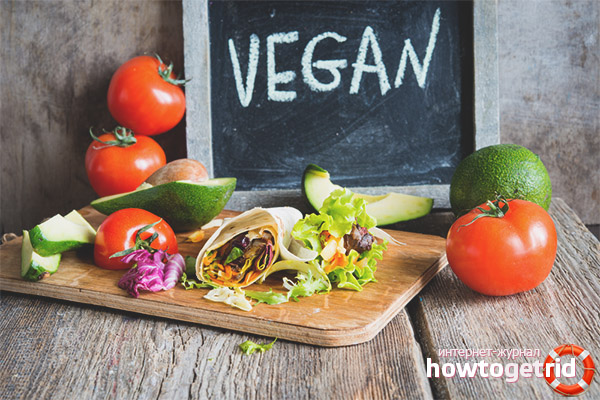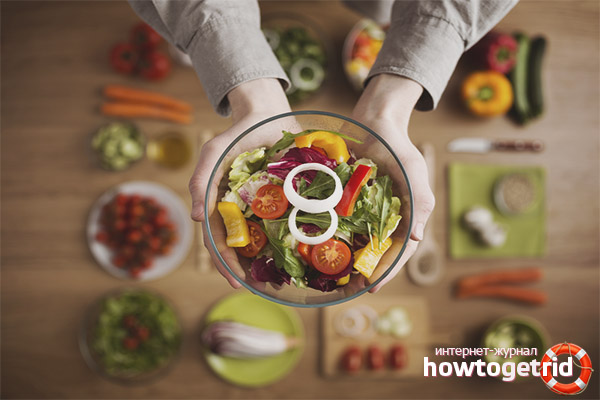The content of the article
In the modern world over the past few decades, a healthy lifestyle, which also includes vegetarianism, has become very widespread and popular. There are more and more adherents of this movement every year, since many consider the rejection of food of animal origin to be very useful for the body.
People began to refuse animal food a very long time ago, in the ranks of vegetarians there were many famous people’s stories, one of which was Pythagoras himself - he was a great philosopher and mathematician. Thanks to the rejection of animal protein and cholesterol, he managed to maintain a young appearance and good health.
To date, the world has divided into two groups in relation to vegetarianism. One group openly promotes such a food system, and the other vice versa - provides many weighty arguments in defense of meat and dairy products. They prove the need for human consumption of animal products.
History of Vegetarianism
Today, many people believe that vegetarianism arose relatively recently and is a common fashion trend, but in fact this is far from the case. Many historical facts confirm that this food culture arose a long time ago, back in the days of ancient civilizations. And her followers were many famous historical figures. Scientists have proven that the consumption of exclusively plant foods began back in the days of the first people on earth, and Buddhists living in ancient India openly promoted vegetarianism. The basis of their propaganda was the love of living beings and the equal rights of both humans and animals to the Almighty.
The ancient founder of the culture of plant food consumption, contemporaries recognized Pythagoras. The followers who supported his position of vegetarianism became many other famous and influential thinkers, the list of which included the well-known figure of the Middle Ages - Leonardo da Vinci. In addition to him, vegetarianism was carried away by Mahatma Gandhi, Isaac Newton and Albert Einstein, and many other scientists. The famous Russian representative of this movement was the legendary classic Leo Tolstoy. Many modern nutritionists explain his incredible energy and excellent memory, which few can boast of, precisely because he adhered to a healthy diet and did not eat food of animal origin.
Familiar to modern man, a vegetarian food system was founded in England, in the 40s in the 19th century, in the city of Manchester. It was there, with the assistance of the local elite, that they founded the first British vegetarian organization, which is actively opposing the consumption of meat in food.
Today, a vegetarian diet is quite popular around the world, and every day the ranks of adherents of such a diet are replenished. However, not in all states vegetarianism succeeds in developing due to the mentality of some countries. So, let's say in the same Poland it is very difficult to find at least one cafe or restaurant with a vegetarian menu. Given that this country is a representative of the European Union, where vegetarianism is flourishing and popularizing, it looks at least strange and unfair to local vegetarians and foreign tourists.Due to their mentality and prejudice, most Poles perceive people who eat products of exclusively plant origin as people with strangeness and are very careful about them.
Varieties of vegetarianism
In the modern world, vegetarianism is a fairly developed system of healthy food consumption, and is divided into four types, which differ in the level of restriction of consumption of animal products and the degree of their processing:
- Classic vegetarian style. It implies the exclusion from the diet of only products made from animal meat, poultry and fish, as well as all seafood. The use of milk, eggs, honey and other products that are produced by animals is quite acceptable. This is justified by the fact that the manufacture of such products does not imply animal abuse. For example, store eggs cannot contain chick embryos, since a chicken egg is used to obtain them.
- Lactose vegetarianism. This diet excludes the use of products of direct animal origin in the form of meat, poultry, fish, seafood and eggs. The use of products made by animals, such as honey and milk, is permitted.
- Vegetarian vegetarianism. It is characterized by the exclusion from the diet of meat and fish products, as well as products from poultry and animal milk. The use of honey and eggs is allowed.
- Veganism. It is the most serious variety of this food culture, since it completely excludes the use of any products whose production relates to animals, including dairy products, honey and, naturally, meat products. Vegans are allowed to eat exclusively plant foods, because this species has a division into two subgroups, which are called raw foodists and fructorians. The diet of the first subgroup implies eating raw or dried foods. The most strict diet of all types of vegetarians is precisely the Fructorians, since they negatively relate to both killing animals for food and destroying plants. This subspecies eats only fruits - fruits, berries, vegetables, nuts, seeds.
They do not immediately become vegans or raw foodists; they come to this diet gradually, having gone through several stages of vegetarianism. However, a vegetarian does not always reach veganism; many who decide to abandon animal products stop at less rigid options, observing an optimal diet for themselves.
Reasons for choosing vegetarianism
Each person comes to the choice of a diet in the form of vegetarianism consciously, for their specific reasons:
- Under the influence of philosophical or ethical beliefs. Such beliefs appear in a person either gradually, due to an increasing feeling of pity for the whole animal world, or spontaneously, due to psychological stress obtained, for example, during the killing of an animal directly in front of such a person.
- Based on medical indications. Today in the world there are many diseases that imply the complete exclusion of animal proteins from the patient’s diet.
- The desire to improve well-being. When switching to plant food, the digestive activity of a person is established, which in turn leads to getting rid of various gastric diseases, such as gastritis or an ulcer. Vegetarians experience an increase in the level of lightness and energy.
Benefits of a Vegetarian Nutrition System
A vegetarian diet is characterized by such a positive effect on the human body:
- The vegetarian’s immune system is strengthened by the regular consumption of large amounts of plant foods, which contain many useful trace elements.
- The digestive system is getting better. Plant fibers contained in food consumed contribute to the improvement of intestinal microflora. Thanks to this, constipation disappears in a person.
- Improvement of the cardiovascular system. This is justified by the lack of cholesterol in food, which is rich in plant foods, and which can lead to heart disease. When switching to vegetarianism, the risk of developing such diseases is minimized.
- Slags and toxins are removed from the body. It is explained by the fact that phytoncides, which contain large quantities of vegetables, contribute to the destruction of harmful bacteria and the prevention of decay processes in the intestines.
- The body of a vegetarian is enriched with many useful substances, such as the right carbohydrates, natural sugars, proteins, vitamins, macro and micronutrients.
- Reducing the intake of salt in food, since plant food needs much less.
- Weight loss due to regular consumption of plant fiber, which contributes to the proper metabolism in the body.
Disadvantages of plant foods
Undoubtedly, a large number of pluses feed, vegetarianism has some disadvantages. However, with the right approach, they are completely removable:
- Not enough protein. In order for the body to receive enough protein, the proper organization of your diet is necessary. In order to enrich the body with complete proteins containing amino acids, it is recommended to regularly eat legumes, pace, soy, tofu, pistachios.
- Vitamin D Deficiency To maintain a normal level of this vitamin in the body, regular exposure to sunlight is recommended, since the sun is the main source of this vitamin. In addition, to restore balance, it is recommended to eat vegetable, soy or cedar oil, beans, oatmeal and various mushrooms, such as chanterelles, mushrooms or porcini.
- Fatty acids and omega-3s. To increase these substances in the body, the use of seaweed, flax seeds, walnuts, and soybeans is recommended. As a supplement, you can use special vitamins containing these substances.
Video: the pros and cons of vegetarianism












Submit